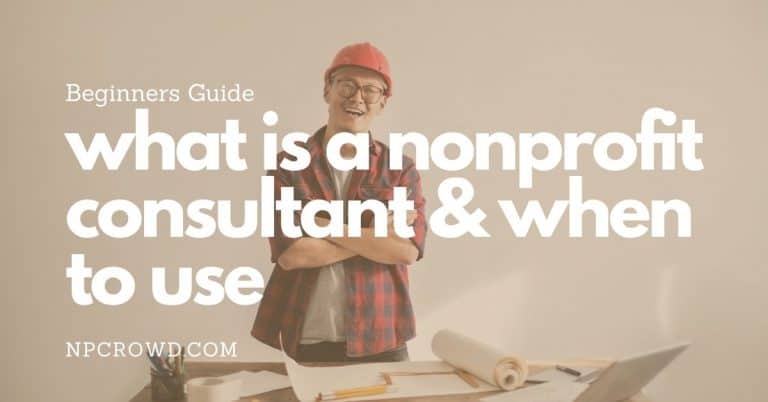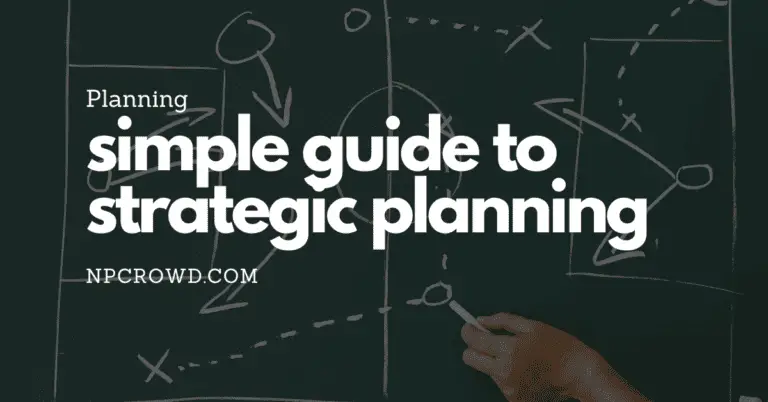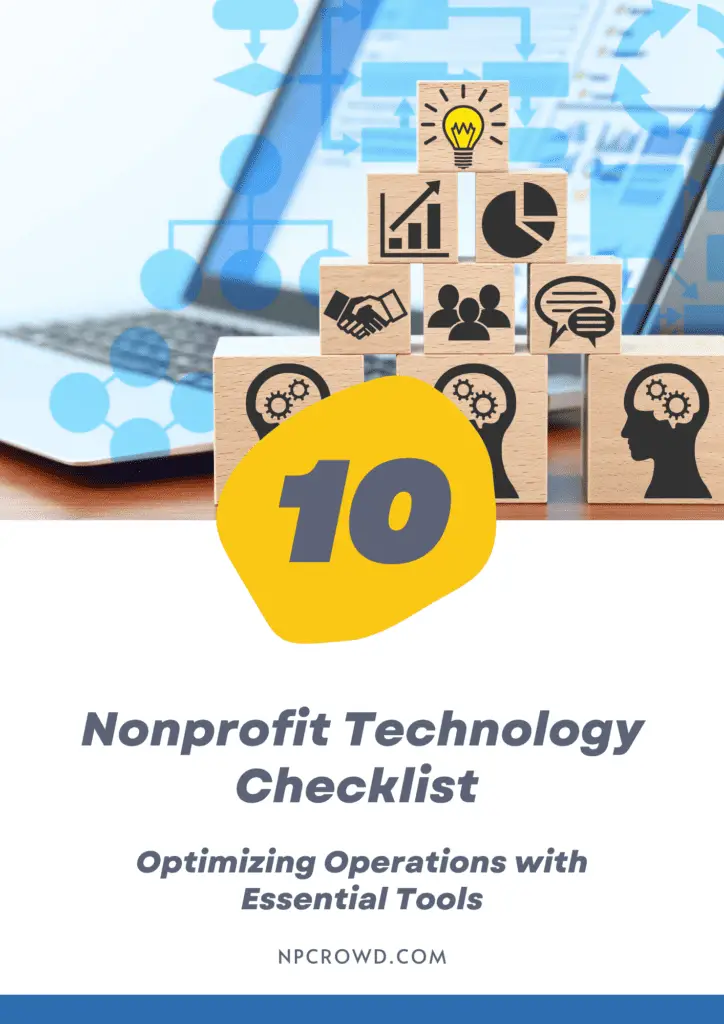The Role of a Nonprofit Strategic Planning Consultant
Disclaimer: This post may contain affiliate links. These links, if used and purchases made, we may earn a small commission. These affiliate programs do not impact the recommendations we make or the resources we refer you to. Our focus is on providing you the best resources for your nonprofit journey.
A nonprofit strategic planning consultant is a professional who specializes in helping nonprofit organizations develop and implement strategic plans. They work closely with nonprofit leaders and stakeholders to assess the organization’s current situation, identify goals and objectives, and create a roadmap for achieving those goals. Their expertise in strategic planning and nonprofit management allows them to provide valuable guidance and support throughout the planning process.Key Takeaways
- Nonprofit strategic planning consultants help organizations develop and implement strategic plans to achieve their goals.
- They conduct comprehensive organizational assessments to identify strengths, weaknesses, and opportunities for growth.
- Consultants facilitate stakeholder engagement to ensure that diverse perspectives are considered in the planning process.
- They have expertise in nonprofit management, governance, fundraising, and evaluation.
- Nonprofit strategic planning consultants face challenges such as navigating complex organizational structures and balancing short-term and long-term goals.
What is a Nonprofit Strategic Planning Consultant?

Understanding the Role
A nonprofit strategic planning consultant plays a crucial role in helping organizations navigate the complexities of their structure and operations. They are responsible for providing effective communication and collaboration strategies to ensure stakeholders have a clear understanding of the organization’s goals and objectives. One approach that can be helpful is to establish mission-aligned sub-committees, allowing board members to connect over shared organizational goals. It’s important to note that board members’ role on these committees is to provide oversight, not engage in operations. Additionally, annual board retreats focused on strategic planning can be beneficial. These retreats provide an opportunity for the organization to review and reaffirm its mission, vision, and values, which are essential for informing decision-making and unifying the team’s efforts into a cohesive strategy.
Key Responsibilities
When working as a nonprofit strategic planning consultant, one of the key responsibilities is conducting a comprehensive organizational assessment. This involves analyzing the organization’s current situation, including its strengths, weaknesses, opportunities, and threats. The consultant gathers data through interviews, surveys, and document reviews to gain a deep understanding of the organization’s internal and external environment.
Based on the assessment, the consultant then collaborates with the nonprofit leaders and stakeholders to identify goals and objectives. These goals should be specific, measurable, achievable, relevant, and time-bound (SMART). The consultant helps the organization define its desired outcomes and develop a roadmap to achieve them.
In addition to assessment and goal-setting, strategic planning consultants also play a crucial role in facilitating the development of strategies and action plans. They help the organization brainstorm and evaluate different strategic options, considering factors such as feasibility, impact, and alignment with the organization’s mission and values.
Throughout the strategic planning process, consultants provide guidance and support in monitoring and evaluation. They help the organization establish metrics and milestones to track progress towards its goals. Regular check-ins and progress reports are essential to ensure that the strategic plan remains on track and adjustments can be made as needed.
Overall, a nonprofit strategic planning consultant serves as a trusted advisor and partner to nonprofit organizations, guiding them through the strategic planning process and helping them achieve their organizational goals.
Skills and Qualifications
In addition to a strong foundation in nonprofit strategic planning, a nonprofit strategic planning consultant should possess a range of skills and qualifications that contribute to their effectiveness in the role. These include:
- Financial analysis skills: Comprehensive knowledge of financial statements and metrics, and the ability to develop strategic and operational implications from them.
- Research and analysis skills: A fluency in analyzing and making meaning from quantitative and qualitative data.
- Project management skills: A keen attention to detail, competency in ‘managing up,’ and the ability to proactively manage multiple competing priorities, to ensure that work is completed accurately, efficiently, and on time.
- Strategic thinking skills: The ability to integrate mission and vision, findings from research and analysis, organizational context, and key stakeholder views to guide client decision-making.
- Commitment to Equity: A strong foundation in the ideas of equity, diversity, inclusion, and social justice.
- Communication and interpersonal skills: The abilities to present information, including quantitative data, to a variety of audiences; write compelling, logically, and without errors; and develop strong relationships and engender trust in clients, partners, and teammates.
While not required, strong consultant candidates may possess one or more of the following:
- Particular interest or experience in the arts & culture, education, or youth development subsectors, or foundations/funders/philanthropy.
- Understanding of how the ideas of equity, diversity, inclusion, and social justice intersect with nonprofit management/philanthropy.
To be successful in the role of a nonprofit strategic planning consultant, it is essential to have a combination of technical expertise and interpersonal skills. This enables consultants to effectively analyze data, develop strategic plans, and collaborate with clients and stakeholders to drive positive change.
Why Nonprofits Need Strategic Planning Consultants

Benefits of Strategic Planning
Strategic planning for nonprofits offers a multitude of benefits that can greatly impact the organization’s success. One of the primary benefits is the clarity it brings to the organization’s purpose, priorities, and objectives. By engaging in the strategic planning process, nonprofits can align their resources and activities, make informed decisions, and adapt to changing external factors. This ensures that the organization stays focused and effectively addresses challenges and opportunities that may arise.
Additionally, strategic planning provides an ideal opportunity for nonprofits to engage with their stakeholders. By checking in with stakeholders and learning about their needs, interests, and priorities, nonprofits can increase transparency, build trust, and enhance credibility. Incorporating stakeholder feedback into the strategic plan allows nonprofits to better serve their constituents and ensure their efforts are aligned with the community’s needs.
Hiring a nonprofit strategic planning consultant can further enhance the benefits of strategic planning. Consultants bring expertise and experience in nonprofit strategic planning, facilitating stakeholder engagement and providing an objective perspective. They ensure that the strategic planning process is comprehensive and effective, guiding nonprofits in setting realistic goals and developing strategies to achieve them.
In summary, strategic planning offers nonprofits the opportunity to gain clarity, align resources, engage stakeholders, and adapt to a changing environment. By investing in strategic planning and considering the expertise of a consultant, nonprofits can maximize their impact and achieve their mission.
Challenges Faced by Nonprofits
Navigating complex organizational structures can be a challenging task for nonprofit strategic planning consultants. With multiple departments and diverse stakeholders, it’s important to have a clear understanding of the organization’s structure and how it functions. Effective communication and collaboration are key in navigating these complexities. One approach that can be helpful is to establish sub-committees that are mission-aligned. These sub-committees can focus on specific areas of the strategic planning process and provide valuable insights and expertise.
Managing stakeholder expectations is another challenge faced by nonprofit strategic planning consultants. Nonprofits often have a wide range of stakeholders, including board members, staff, volunteers, donors, and community members. Each stakeholder group may have different expectations and priorities, making it important to effectively communicate and align their interests. Regular communication, feedback sessions, and stakeholder engagement activities can help manage expectations and ensure that all stakeholders are involved in the planning process.
Adapting to changing external factors is a constant challenge for nonprofit strategic planning consultants. Nonprofits operate in a dynamic and unpredictable environment, facing economic uncertainty, potential funding cuts, and competition from other organizations with similar missions. To navigate these challenges, consultants need to stay informed about the external landscape and continuously assess the potential impact on the organization. They should also be proactive in identifying opportunities and adapting strategies to address emerging trends and challenges.
Balancing short-term and long-term goals is another challenge faced by nonprofit strategic planning consultants. Nonprofits often have immediate needs and goals that require attention, such as fundraising or program implementation. At the same time, they need to plan for the long-term sustainability and growth of the organization. Consultants play a crucial role in helping nonprofits strike a balance between short-term and long-term goals, ensuring that resources are allocated effectively and that the organization remains focused on its mission and vision.
How Consultants Can Help
Consultants provide an unbiased and objective perspective on your organization’s strengths, weaknesses, opportunities, and threats. They can identify areas for improvement and help you develop a strategic plan that aligns with your goals. Strategic planning consultants have the expertise to streamline the planning process and keep it focused. They can guide you through each step, ensuring that your resources and efforts are directed towards achieving your organizational goals. Consultants facilitate stakeholder engagement, ensuring that all relevant parties are involved in the planning process. This collaborative approach fosters buy-in and increases the likelihood of successful implementation. Additionally, consultants bring specialized knowledge and experience in nonprofit strategic planning, allowing them to provide valuable insights and guidance. Working with a consultant also helps organizations stay accountable to their goals and ensures that the strategic plan is implemented effectively.
The Process of Strategic Planning for Nonprofits

Assessing the Current Situation
As a nonprofit strategic planning consultant, one of the key responsibilities is conducting a comprehensive organizational assessment. This assessment involves evaluating various aspects of the organization, such as its mission, goals, programs, operations, and resources. By conducting a thorough assessment, consultants can gain a deep understanding of the organization’s strengths, weaknesses, opportunities, and threats.
To conduct an organizational assessment, consultants may use a combination of qualitative and quantitative methods. This can include reviewing documents and data, conducting interviews and surveys, and observing organizational processes. The goal is to gather information that will inform the development of a strategic plan.
Here are some key steps involved in conducting a comprehensive organizational assessment:
- Reviewing the organization’s mission, vision, and values to ensure alignment with its goals and objectives.
- Analyzing the organization’s internal and external environment, including factors such as competition, funding sources, and regulatory requirements.
- Assessing the organization’s programs and services to determine their effectiveness and impact.
- Evaluating the organization’s financial health and sustainability.
- Identifying the organization’s strengths, weaknesses, opportunities, and threats.
It is important for consultants to approach the assessment process with objectivity and sensitivity. They should create a safe and inclusive space for stakeholders to share their perspectives and experiences. By gathering and analyzing relevant data, consultants can provide valuable insights and recommendations for the organization’s strategic planning process.
Setting Goals and Objectives
Once the current situation has been assessed, the next step in the strategic planning process for nonprofits is setting goals and objectives. This is a crucial phase as it lays the foundation for the organization’s future direction and success. Goals are the broad, overarching outcomes that the nonprofit aims to achieve, while objectives are specific, measurable steps that will be taken to reach those goals.
To ensure clarity and alignment, it is important to involve key stakeholders in the goal-setting process. By engaging board members, staff, volunteers, and even beneficiaries, the organization can benefit from diverse perspectives and ensure that the goals reflect the needs and aspirations of all involved.
Once the goals have been established, it is essential to define clear and measurable objectives. These objectives should be SMART: Specific, Measurable, Achievable, Relevant, and Time-bound. SMART objectives provide a roadmap for the organization, guiding decision-making and resource allocation.
In addition to setting goals and objectives, it is important to communicate them effectively throughout the organization. By sharing the goals and objectives with staff and volunteers, everyone can work towards a common purpose and understand how their individual efforts contribute to the overall mission and vision of the nonprofit.
Developing Strategies and Action Plans
Creating realistic and actionable strategic plans is a crucial aspect of the nonprofit strategic planning process. It involves aligning organizational goals with practical and achievable strategies. To ensure the effectiveness of the strategic plan, it’s essential to consider the following key elements:
- Flexibility: Build flexibility into the plan to adapt to changing external factors and emerging opportunities.
- Communication and Transparency: Share the strategic plan with stakeholders to foster trust and accountability. Regularly communicate progress and updates to keep everyone informed and engaged.
- Implementation: Put the strategic plan into action by fostering collaboration among staff, volunteers, and board members to achieve the outlined objectives.
- Review and Refresh: Regularly review and refresh the plan to ensure alignment with the organization’s mission, vision, and evolving needs.
Monitoring and Evaluation
Monitoring and evaluation are essential components of nonprofit strategic planning. Evaluation allows organizations to assess the effectiveness and efficiency of their programs and initiatives, while monitoring helps track progress and adapt programs for maximum impact. Nonprofit strategic planning consultants play a crucial role in developing clear evaluation frameworks and methodologies that align with the organization’s goals and objectives. They collect and analyze relevant data to assess program outcomes and identify areas for improvement. Engaging stakeholders in the evaluation process ensures diverse perspectives and insights. The findings from the evaluation are used to inform decision-making and drive continuous improvement.
Best Practices for Nonprofit Strategic Planning

Engaging Stakeholders
When it comes to strategic planning for nonprofit organizations, one of the key steps is facilitating stakeholder engagement. This involves having conversations with key stakeholders to hear their external perspectives and understand their needs and expectations. By involving all important stakeholders in the process, including staff, board members, volunteers, funders, and partners, you can ensure that the strategic plan addresses current and emerging needs, as well as known and unplanned barriers.
Here are some tips for facilitating stakeholder engagement:
- Conduct interviews or surveys to gather input from stakeholders
- Organize focus groups or workshops to foster collaboration
- Use data visualization tools to present information in a clear and accessible way
- Provide regular updates and opportunities for feedback throughout the planning process
An inclusive approach is crucial when engaging stakeholders. While not all voices will be weighted equally or involved at every stage, it is important to give everyone a voice and consider their input. This inclusive approach helps create a valuable strategic plan that reflects the diverse perspectives and interests of the stakeholders.
In addition to inclusive engagement, data should also be used to inform the decision-making process. By gathering and analyzing relevant data, such as organizational metrics and external trends, you can make informed decisions that align with the organization’s goals and mission.
Remember, engaging stakeholders is not just about gathering input, but also about building strong relationships. By involving diverse stakeholders and creating a sense of community, you can foster a collaborative and supportive environment that contributes to the organization’s success.
Creating a Clear Vision
Creating a clear vision is a crucial step in the strategic planning process for nonprofits. Having a clear vision of what success looks like provides both a clear goal and destination for the entire organization. It sets the direction and guides decision-making. A clear vision helps align the efforts of staff, volunteers, and board members towards a common purpose.
To create a clear vision, it is important to involve key stakeholders in the process. This includes board members, staff, volunteers, and even beneficiaries of the nonprofit’s services. By engaging stakeholders, you can gather diverse perspectives and ensure that the vision reflects the values and aspirations of the organization.
Once the vision is defined, it is essential to communicate it effectively to all stakeholders. This helps create a shared understanding and commitment to the vision. Regularly communicating the vision keeps everyone informed and motivated, fostering a sense of unity and purpose within the organization.
Aligning with Mission and Values
Aligning with the mission and values of a nonprofit organization is essential for its success. The mission defines the purpose and objectives of the organization, while the values guide decision-making processes and ensure consistency with the overall objectives. By aligning with the mission and values, nonprofit organizations can stay focused on their purpose and make informed decisions. This alignment also allows the organization to review, adjust, and reaffirm its mission, vision, and values, which are vital for informing decision-making and unifying the team’s efforts into a cohesive strategy.
One way to ensure alignment is by recognizing and applauding team members who live up to the nonprofit’s values. This recognition can help create a culture of engagement and inspire staff members in their roles. Additionally, building a strong board of directors is another important aspect of aligning with the mission and values. The board plays a crucial role in guiding the organization and ensuring its actions are consistent with its purpose and values.
To summarize, aligning with the mission and values of a nonprofit organization is crucial for maintaining focus, making informed decisions, and creating a strong organizational culture.
Building a Strong Organizational Culture
Building a strong organizational culture is essential for the success of a nonprofit. Culture refers to the shared values, beliefs, and behaviors that shape the identity of an organization. It sets the tone for how employees interact with each other, how decisions are made, and how work is accomplished. A strong organizational culture fosters a sense of belonging, collaboration, and accountability among team members.
One way to build a strong organizational culture is by engaging stakeholders. This includes board members, staff, volunteers, and even the community. By involving stakeholders in decision-making processes and seeking their input, you create a sense of ownership and shared responsibility. This can lead to increased commitment and dedication to the organization’s mission and goals.
Another important aspect of building a strong organizational culture is recognizing and rewarding employees. When staff members feel valued and appreciated, they are more likely to be motivated and engaged in their work. Recognizing and rewarding employees can be done through various means, such as employee recognition programs, performance bonuses, or even simple gestures of appreciation.
Additionally, communication plays a crucial role in building a strong organizational culture. Open and transparent communication channels allow for the exchange of ideas, feedback, and information. Regularly sharing updates, goals, and achievements with team members helps create a sense of unity and alignment towards a common purpose.
Finally, it is important to lead by example. As a nonprofit strategic planning consultant, you have the opportunity to influence and shape the organizational culture of the nonprofits you work with. By demonstrating the values and behaviors you expect from others, you set a positive example and inspire others to follow suit. Your actions and attitudes can have a ripple effect throughout the organization, creating a culture of integrity, professionalism, and collaboration.
Frequently Asked Questions
What is the role of a nonprofit strategic planning consultant?
A nonprofit strategic planning consultant is a professional who specializes in helping nonprofit organizations develop and implement strategic plans. They work closely with nonprofit leaders and stakeholders to assess the organization’s current situation, identify goals and objectives, and create a roadmap for achieving those goals.
Why do nonprofits need strategic planning consultants?
Nonprofits need strategic planning consultants to benefit from their expertise in strategic planning and nonprofit management. Consultants can help nonprofits overcome challenges, such as navigating complex organizational structures and balancing short-term and long-term goals.
What is the process of strategic planning for nonprofits?
The process of strategic planning for nonprofits involves assessing the current situation of the organization, setting goals and objectives, developing strategies and action plans, and monitoring and evaluating the progress.
What are the best practices for nonprofit strategic planning?
Best practices for nonprofit strategic planning include engaging stakeholders, creating a clear vision, aligning with mission and values, and building a strong organizational culture.
What are the key responsibilities of a nonprofit strategic planning consultant?
The key responsibilities of a nonprofit strategic planning consultant include conducting a comprehensive organizational assessment, facilitating stakeholder engagement, developing strategic plans, and providing guidance and support throughout the planning process.
What are the benefits of hiring a nonprofit strategic planning consultant?
Hiring a nonprofit strategic planning consultant can provide benefits such as expertise and experience in strategic planning, an objective perspective on the organization’s strengths and weaknesses, and customized solutions tailored to the organization’s goals and resources.







